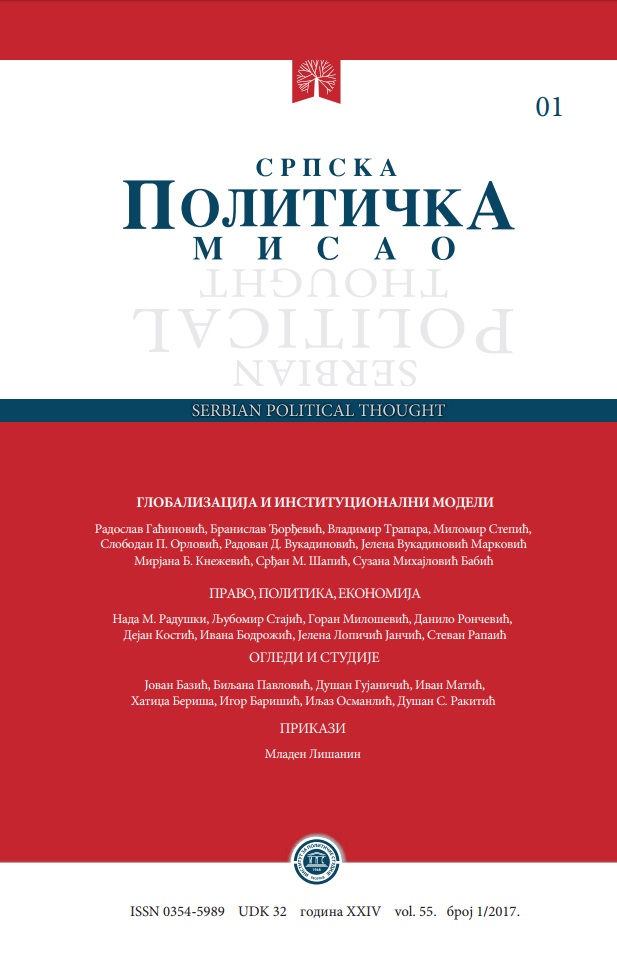O политичкој опозицији
About Political Opposition
Author(s): Slobodan P. OrlovićSubject(s): Government/Political systems, Political behavior, Sociology of Politics
Published by: Институт за политичке студије
Keywords: political opposition; political minorities; change of government; opposition political parties in Serbia
Summary/Abstract: An opinion which is opposed to the ruling and majority opinion, or at least adjusted, is the opposition opinion. Transferred to the policy, it means that activity of political opposition implies a criticism of the government. Opposition political parties are creators and carriers of that criticism and the condition of existence of a democratic state. In a democratic state the government establishes and implements a comprehensive political plan on which is influenced by the institutionalized opposition, primarily by resistance. The opposition has in its hands specific factual and legal tools that not only contest measures of the government, but tries to present itself better to the public opinion. Those tools are: protests, promotions, reports and many legal instruments, from legislative and constitutional initiative to the review of constitutionality of legal acts. An opinion which is opposed to the ruling and majority opinion, or at least adjusted, is the opposition opinion. Transferred to the policy, it means that activity of political opposition implies a criticism of the government. Opposition political parties are creators and carriers of that criticism and the condition of existence of a democratic state. In a democratic state the government establishes and implements a comprehensive political plan on which is influenced by the institutionalized opposition, primarily by resistance. The opposition has in its hands specific factual and legal tools that not only contest measures of the government, but tries to present itself better to the public opinion. Those tools are: protests, promotions, reports and many legal instruments, from legislative and constitutional initiative to the review of constitutionality of legal acts. However, the mechanism in which the opposition trusts the most, are elections. In democratic countries, the reality is a periodic changeof the government by elections. This requires legal and political conditions which give the opposition a chance to win. It doesn’t mean that longer stay in the opposition is a sign of lack of democracy, nor that frequent change of political parties in governing is the proof of a democratic nature of the system. Political and the overall social conditions of each state, as well as some specific circumstance or detail, affect the outcome – victory or defeat in the elections. Opposition political parties in stable democracies are part of the system and protect it. Over time, they mitigate the ideological diversity in regard to the ruling party, as well as in regard to other parties in the parliament, and even outside it. This convergence of programs of the parties raises the question of how much people actually have the possibility to elect. Also, the loss of the political identity of opposition and their adopting of the reform character, weakens their power. The opposition has become, from the contrary and vanguard, a potential “partner” with a limited power also because it is institutionally linked with the parliament. Thus the parliament is in effect managed by the government, or by the ruling political party. Opposition parties in Serbia during the 25-year history of multiparty have gone through different phases – from the uncompromising opponents to the potential and actual allies of government. In view of legal position, all registered political parties are equal in the Constitution and statute, with the proviso that statute makes some differences between large and small, ordinary and minority parties. Even pure proportional electoral system mathematically puts all parties in the same position. In political sense, most parties do not save ideological consistency, but they are practically ready to make an alliance with any other party. It reflects negatively on the political opposition attractiveness and disables it to achieve lasting support in certain social groups. This portrays the fact that in the circumstances of financial support and marketing success, institutionalized opposition party can win in elections. And after that quickly loses voters and falls to the level of electoral census because another has greater resources and better (more expensive) promotion.
Journal: Српска политичка мисао
- Issue Year: 2017
- Issue No: 1
- Page Range: 81-101
- Page Count: 21
- Language: Serbian

